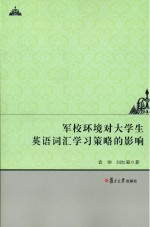

军校环境对大学生英语词汇学习策略的影响PDF格式文档图书下载
Chapter One Introduction 1
1 1 Background of the Research 1
1.2 Significance of the Study 2
1.2.1 Learning Context 2
1.2.2 College Context 3
1.2.3 Military Context 4
Chapter Two Literature Review 7
2.1 Foreign Language Learning Strategies 7
2.1.1 Overview of Language Learning Strategies 7
2.1.2 Taxonomies of Language Learning Strategies 8
2.1.2.1 O'Malley and Chomot's Category 9
2.1.2.2 Oxford's Taxonomy 9
2.2 Vocabulary Learning Strategies 12
2.2.1 Language Learning Strategies vs. Vocabulary Learning Strategies 12
2.2.2 Taxonomies of Vocabulary Learning Strategies 13
2.3 Prior Empirical Research on Vocabulary Learning Strategies 16
2.3.1 Schmitt's Study 16
2.3.2 Gu and Johnson's Study 17
2.3.3 Wu Xia and Wang Qiang's Study 17
2.3.4 Wang Wenyu's Study 18
2.3.5 Limitations of Previous Studies 19
2.4 Purpose of This Study 20
Chapter Three Theoretical Frame 22
3.1 Metacognitive Strategies 22
3.1.1 Metacognition 22
3.1.2 The Definition of M etacognitive Strategies 25
3.1.3 The Classification of Metacognitive Strategies 26
3.2 Cognitive Perspectives on Language Learning 30
3.2.1 Hypothesis-Testing Theory 30
3.2.1.1 The Definition of Hypothesis-Testing Theory 30
3.2.1.2 The Process of Hypothesis-Testing 30
3.2.2 Levels of Processing Framework 32
3.2.3 Involvement Load Hypothesis 33
3.2.4 Repetition or Rehearsal 34
3.2.5 Noticing Hypothesis 35
3.2.6 Functions of Note-Taking 37
Chapter Four The Empirical Study 39
4.1 The Pilot Study 39
4.1.1 Purpose 39
4.1.2 Participants 39
4.1.3 Instrument 40
4.1.4 Procedures 41
4.2 The Main Study 42
4.2.1 Research Questions 42
4.2.2 Subjects 42
4.2.3 Instruments 43
4.2.4 Procedure 44
Chapter Five Results and Discussion 45
5.1 0verview of the Empirical Study 45
5.2 Cadets' Vocabulary Learning Beliefs,Strategies and Learning Outcomes 47
5.3 Strategies Used Between Successful Learners and Less Successful Learners 59
5.4 Different Context in Strategy Use 64
Chapter Six Effectiveness of Metacognitive Strategies Training 71
6.1 Purpose 71
6.2 Framework of the Metacognitive Strategies Training 72
6.3 Participants 93
6.4 Group Design 94
6.4.1 Group Design 94
6.4.2 Advantages of This Design 94
6.5 Instruments 95
6.6 Experimental Schedule 96
6.7 Data Collection,Analyses and Discussion 96
6.7.1 Data Collection,Analyses and Discussion of the Vocabulary Tests 96
6.7.1.1 Data Collection and Analyses 96
6.7.1.2 Data Discussion 103
6.7.2 Data Collection,Analyses and Discussion of the Questionnaire 104
6.7.2.1 Results ofPre-Treatment Questionnaire 104
6.7.2.2 Results of Post-Treatment Questionnaire 107
6.7.2.3 Data Discussion of the Questionnaire 109
6.7.3 Correlation Analysis between Metacogni tive Strategies and VocabularyProficiency 111
6.7.4 Major Findings 112
Chapter Seven Effectiveness of Guessing and Bidic Strategies Training 116
7.1 Purpose 116
7.2 Framework of the Guessing Strategy Training 117
7.3 Framework of the Strategy Training of Consulting a Bilingualized Dictionary 123
7.4 Participants 126
7.5 Method 126
7.5.1 Passages Selected for the Experiment 126
7.5.2 Target Words for Testing 127
7.5.3 Task Design 128
7.5.4 Procedures and Tests 129
7.6 Data Collection,Analyses and Discussion 130
7.6.1 Data Collection and Analyses 130
7.6.2 Data Discussion 135
Chapter Eight Effectiveness of Note-Taking Strategy Training 142
8 1 Purpose 142
8.2 Framework of the Note-Taking Strategy Training 143
8.3 Experiment One 148
8.3.1 Participants 148
8.3.2 Group Design 148
8.3.2.1 Group Design 148
8.3.2.2 Advantages of This Design 149
8.3.3 Target Words and Expressions 149
8.3.4 Experimental Schedule 149
8.3.5 Test 150
8.3.6 Data Collection and Analyses 152
8.3.6.1 Data Collection and Analyses of Test One 152
8.3.6.2 Data Collection and Analyses of Test Two 153
8.4 Experiment Two 155
8.4.1 Participants 155
8.4.2 Group Design 156
8.4.2.1 Group Design 156
8.4.2.2 Advantages of This Design 156
8.4.3 Target Words and Expressions 156
8.4.4 Experimental Schedule 156
8.4.5 Test 157
8.4.6 Data Collection,Analyses and Discussion 159
8.4.6.1 Data Collection and Analyses of Test One 159
8.4.6.2 Data Collection and Analyses of Test Two 160
8.5 Major Findings 163
Chapter Nine Conclusions and Suggestions 167
9.1 Conclusions 167
9.2 Implications 170
9.3 Limitations 172
9.4 Recommendations 172
References 174
Appendix A 185
Appendix B 187
Appendix C 189
Appendix D 191
Appendix E 192
Appendix F 196
Appendix G 197
Appendix H 203
- 《军校环境对大学生英语词汇学习策略的影响》袁沛,闫红菊著 2015
- 《大学英语词汇教学与学习》梁红卫著 2013
- 《大学英语四级考试词汇高效训练》伏春宇主编;张绘,姜婷仪副主编;王登霞,王嫦丽,严锋等编者 2011
- 《英语词汇学习策略研究》朱厚敏著 2009
- 《英语词汇学习策略》周晓玲,严幸智主编 2013
- 《英语词汇学习策略与技巧》祖凤霞著 2008
- 《英语词汇学习策略与实践》臧学运,石磊,黄迎主编 2006
- 《初中英语词汇学教学策略探讨》闫志洁,杜俊秀,谯菊梅主编 2019
- 《心理语言学视域的英语词汇学习策略》段世齐编著 2008
- 《雅思策略 词汇》许中二,俞大纬主编 2002
- 《军校环境对大学生英语词汇学习策略的影响》袁沛,闫红菊著 2015
- 《汉语修辞与词汇发展关系研究》许红菊著 2018
- 《巴比伦富翁的秘密》(美)乔治·寒缪尔·卡拉森著;闫红菊译 2013
- 《货币信贷政策践行新探》严长松,胡红菊著 2008
- 《专利许可法律问题研究》徐红菊著 2007
- 《古城衢陌 太原街巷捭阖》继祖,红菊著 2009
- 《晋阳豪杰 太原历史名人》继祖,红菊著 2009
- 《品牌“绯闻期”广告行为研究》刘红菊著 2013
- 《专利权战略学》徐红菊著 2009
- 《现代汉语复合词语义结构研究》颜红菊著 2008
- 《上海方言词汇集》(英)艾约瑟(J.Edkins)编著 2016
- 《THE GOVERNMENT/PRESS CONNECTION PRESS OFFICERS AND THEIR OFFICES》STEPHEN HESS 1984
- 《PRESS》POLITICS & PUBLIC OPINION IN BIHAR 1912-1947 2010
- 《Press law》Robin Callender Smith. 1978
- 《SUING THE PRESS》RODNEY A.SMOLLA 1986
- 《THE PRESS AND AMERICA》 2222
- 《FREEDOM OF THE PRESS》ERIC BARENDT 2009
- 《FREEDOM OF THE PRESS》ROB EDELMAN 2006
- 《FREEDOM OF THE PRESS》DAVID L.GEBERT 2005
- 《Racism and the press》Teun A.van Dijk 2016
